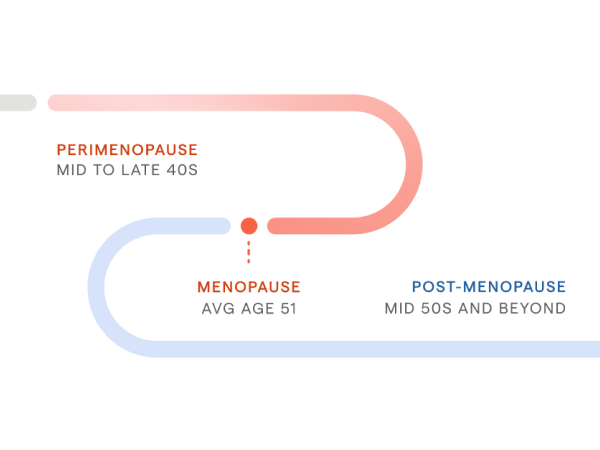Despite the fact that menopause is a natural, universal transition, and that menopause symptoms have been recorded since as early as the 1500’s, there is still a lot about menopause that remains shrouded in mystery.
Menopause is not a disease or a disorder. It’s a sign of strength, not weakness.. However, that doesn’t mean that menopause symptoms are always easy to manage.
In order to navigate this transition smoothly, it’s essential that you understand the symptoms you could face, as well as seek the right support for assistance.

Find relief from menopause symptoms
Connect with a nurse practitioner who specializes in menopause treatment. Get personalized care without the waiting room.
The differences between perimenopause and menopause aren’t universally understood, which is why we’ve put together some useful information to help you make sense of these differences.
It’s important to know what to expect, as well as how these terms differ from one another. This way, when your practitioner starts talking about perimenopause, menopause, or postmenopause, you’ll understand what they’re saying.
What is Perimenopause?
Perimenopause is the time leading up to menopause. It’s marked by changes in the menstrual cycle and hormone levels, as your body prepares for the final menstrual period.
On average, perimenopause lasts about 7 years. The exact duration varies from person to person. Some individuals remain in perimenopause between 3 and 10 years, while it can be as long as 14 years for some people.
While hormone (estrogen and progesterone) levels tend to decrease during perimenopause, they don’t just fall steadily. These fluctuating hormones can lead to the common symptoms associated with perimenopause (i.e., hot flashes, mood changes, sleep disturbances, brain fog).
Other hormone levels like testosterone tend to decrease gradually as we age, but this decline is not tied as directly to egg development as estrogen and progesterone are. These other decreased hormones can lead to reduced libido, mood changes, and low energy levels, but it’s more of a gradual process. It can occur over many years, and isn’t limited to perimenopause.
So, while all of these hormones generally do decline throughout perimenopause, it’s not a direct result of the cessation of ovarian function. It’s a much more complex process that involves fluctuating hormone levels and gradual changes leading into menopause.
What is the Difference Between Perimenopause and Menopause?
Menopause occurs when you have not had a menstrual period for one year.
From a scientific standpoint, menopause is just one day. The day one year after your last menstrual cycle. However, when we talk about menopause colloquially, most people refer to the entire transition (i.e., perimenopause, menopause, and postmenopause) simply as menopause; although these are actually three distinct and separate stages.
Perimenopause is the beginning of your body’s menopause transition. Think of it this way: if menopause is the destination, perimenopause is the route you take to get there. After your day of menopause, postmenopause lasts for the rest of your life.
The average age that menopause occurs is between 50-52 in Canada, which means that most people spend half to a third of their lives in postmenopause.
If you believe that you’ve entered perimenopause, and you’re beginning to experience challenging symptoms, talk to a healthcare practitioner at Felix. They’ll be able to offer guidance on lifestyle and treatment options that you can use to take back control of your health and comfort.
Symptoms of Perimenopause and Menopause
Menopause symptoms can vary widely from one person to another. Some people may only experience certain symptoms, and the severity of these symptoms can range anywhere from mild to intense, depending on the individual.
Some of the most common symptoms include:
- Hot flashes or night sweats
- Insomnia
- Mood changes
- Breast tenderness
- Dry skin
- Headaches
- Hair thinning
- Muscle and joint pain
- Rapid heartbeat
- Changes in your libido (sex drive)
If you’re wondering what the first signs of perimenopause are, most people experience irregular periods, alongside certain other symptoms (i.e., hot flashes, mood changes, sleep disturbance, brain fog).
Typically, this begins when cycles lengthen by 7+ days, or you may skip the occasional period. When you miss two periods in a row (60 days between periods), there’s a 95% chance that your final period will likely occur within the next 4 years.
Individuals that have entered perimenopause still ovulate, but it may not be monthly.
It’s important to note that pregnancy can still happen during this time, so birth control and contraceptives are still advised, if you want to avoid becoming pregnant.
Menopause Symptoms by Stage
Now that you know some of the common symptoms, let’s explore when these symptoms often occur, during the menopause continuum:
Perimenopause symptoms:
At this point, you may experience menopause-related symptoms, such as:
- Irregular periods
- Hot flashes
- Night sweats
- Vaginal dryness
- Pain before, during, or after sex
- Changes in libido
- Mood changes that could lead to anxiety or depression
- Sleep disturbances that could cause insomnia
Postmenopause symptoms:
At this point:
- Periods will stop
- Vasomotor symptoms (i.e., hot flashes, night sweats, etc.) peak in intensity
- The other symptoms listed above (especially the genitourinary symptoms) can peak too
This isn’t an extensive list, and the symptoms may look a little bit different for each person, depending on their individual biology, genetics, health, lifestyle, age, and medical history.
How is Perimenopause Diagnosed?
Perimenopause is diagnosed based on your symptoms. Often, these symptoms will be accompanied by irregular periods.
In some cases, certain tests (i.e., blood tests checking FSH levels) are suggested when the practitioner is trying to identify either early or premature menopause.
However, these tests can be misleading during perimenopause, because of fluctuating hormone levels in your body. Also, over the age of 45, they offer very little value. Because of these factors, these types of tests are generally not recommended.
Talking to a healthcare practitioner from Felix can help you get a diagnosis for perimenopause, if you believe that you’re starting to experience irregular periods or symptoms associated with the menopausal transition.
At What Age Does Perimenopause Begin?
The age that perimenopause can begin is quite broad; as early as the mid-to-late 30’s, and as late as the early-to-mid 50’s. Most people begin to experience the symptoms of perimenopause in their mid-to-late 40’s.
If you’re starting to experience the symptoms of perimenopause before the age of 40, you should visit a healthcare practitioner as this may be a sign of early or premature menopause.
How Long Does Perimenopause Last?
This really depends on the individual, their genetics, biology, health, and medical history. Perimenopause can last anywhere from a few months to several years.
On average, it lasts about 7 years. However, for some people, it can last as long as 14 years.
Should I Talk to a Doctor About Perimenopause?
If you believe that you’re entering the perimenopause transition, and you’re starting to experience symptoms that are affecting your health or quality of life, it’s time to talk to a healthcare practitioner.
Felix is dedicated to providing ongoing, validating support for people experiencing menopause or perimenopause symptoms; including treatment options that can help reduce the severity of their symptoms.
Just complete an online assessment, and a healthcare practitioner will be able to offer any guidance on how to manage any symptoms you begin to experience.
Menopause is a normal life transition that every woman experiences, but that doesn’t mean that you have to live in discomfort with its symptoms. Felix is here to help you take back control of your health, so you can get back to living life on your terms.
While our use of the term ‘women’ when talking about the menopause transition is based on existing scientific research and literature, we recognize this is not inclusive of everyone’s experience. To the transgender men and non-binary folx who will experience menopause, and the transgender women who won’t — know that we see you and are continuing to work toward a way to create space for everyone in this conversation.



